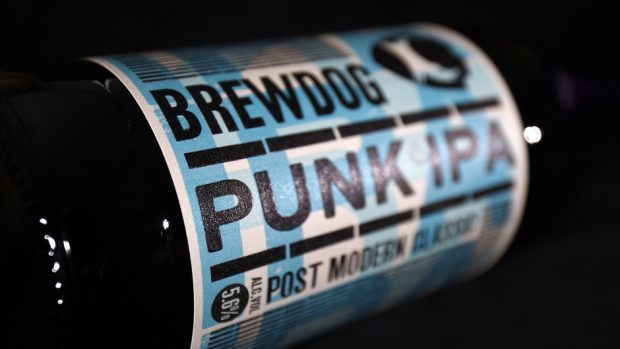Brewdog has been rapped by advertising watchdogs over a competition where customers won beer cans wrongly billed as being made of “solid gold”.
The craft brewer launched two promotions where 15 of the cans were hidden inside multi-packs of their beers and they said each was worth £15,000.
However, it turned out the cans were only gold plated and contained a tiny amount of the precious metal.
The Advertising Standards Authority(ASA) launched an investigation after 25 people complained that the prize was not made from solid gold.
Brewdog told the ASA that the “solid gold” claim in three social media posts had been made in error and that they had publicly apologised for it.
However the firm, who are based in Ellon, Aberdeenshire, stood by its estimate that the winning cans were worth £15,000.
And it has responded to the ASA’s ruling by launching a new version of the competition – this time giving people the chance to win diamond-encrusted gold-plated cans, which the brewer says are worth £25,000 each.
‘The promotion caused unnecessary disappointment to participants’
In a written ruling on the original ads, which were posted in November 2020 and February this year, the ASA said they were misleading.
“Each of the ads (a), (b) and (c) stated that the prize included a ‘solid gold’ can. Ad (a) also stated the can was ‘worth £15K’.
“We considered a general audience was unlikely to be aware of the price of gold, how that would translate into the price of a gold can, and whether that was inconsistent with the valuation as stated in the ad.
“However, we understood the prize consisted of 24 carat gold-plated replica cans. Therefore, because the ads stated that the prize included a ‘solid gold’ can when that was not the case, we concluded the ads were misleading.
“We considered that because the awarded prize was not the same as that described in the ads, the promotion caused unnecessary disappointment to participants and therefore breached the Code.
“We told Brewdog not to state or imply that consumers would receive a solid gold can when that was not the case. We also told them to conduct their promotions equitably and fairly, and to avoid causing unnecessary disappointment.”
Mark Craig, from Lisburn, Northern Ireland, was among fans of the brewery who snapped up cases of its flagship beer, Punk IPA, to find one of the gold versions inside.
The 32-year-old, who had hoped to fund his wedding by selling the gold, discovered the can was only plated with the metal after asking for a certificate from Brewdog.
Speaking in June, he said: “I ultimately feel disappointed. When I won I was ecstatic, believing a solid gold can could contribute towards bills and our wedding, which has been postponed until 2022.”
Brewdog said the promotional cans were gold plated and were manufactured by goldsmiths Thomas Lyte using materials of the highest quality. They provided a certificate from the manufacturer to confirm the cans were plated in 24 carat gold.
They said that they amended the posts as soon as that error was noticed. However, they explained they were unable to amend tweets and therefore rather than delete the tweet, they ensured that subsequent tweets dropped the word “solid”, and all references thereafter were to “gold cans”.
The company claimed a single 330ml can, made with the equivalent 330ml of pure gold, would have a gold value of about $500,000 at the current gold price of $1,800 per ounce.
They said they could not see “that any reasonable consumer who entered the competition would assume they were going to win over half a million dollars of gold”. The firm said they had never been provided with a valuation which contradicted their estimated value.
Brewdog responds by launching new competition
Brewdog responded to the ruling by announcing they were launching a new competition giving people the chance to win one of 10 diamond encrusted gold plated cans.
They said winners will have the option of claiming a can worth £25,000, or they can take £25,000 in cash if they prefer.
James Watt, co-founder of Brewdog, said: “We hold our hands up, we got the first gold can campaign wrong.
“Whilst we still stand by the valuation, we made mistakes which we’ve learnt from.
“And now we want to give ten lucky people the chance to win big – way, way bigger than before. It’ll be a short campaign over ten days, and we’ll contact a new winner each day to let them know they’ve won.”
Brewdog, which has been valued at up to £1 billion, was founded in 2007 by James Watt and Martin Dickie, who were at school together in Aberdeenshire.
In June the brewer was accused of perpetuating a “culture of fear” in the workplace by former staff. Mr Watt apologised and pledged to launch an investigation into the claims.


